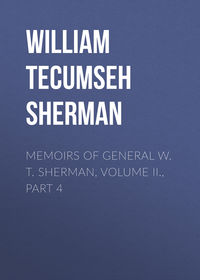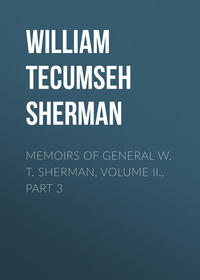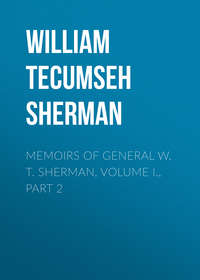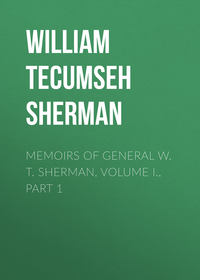 полная версия
полная версияMemoirs of General William T. Sherman — Complete
At the time of my arrival, San Francisco was an the top wave of speculation and prosperity. Major Turner had rented at six hundred dollars a month the office formerly used and then owned by Adams & Co., on the east side of Montgomery Street, between Sacramento and California Streets. B. R. Nisbet was the active partner, and James Reilly the teller. Already the bank of Lucas, Turner & Co. was established, and was engaged in selling bills of exchange, receiving deposits, and loaning money at three per cent. a month.
Page, Bacon & Co., and Adams & Co., were in full blast across the street, in Parrott's new granite building, and other bankers were doing seemingly a prosperous business, among them Wells, Fargo & Co.; Drexel, Sather & Church; Burgoyne & Co.; James King of Win.; Sanders & Brenham; Davidson & Co.; Palmer, Cook & Co., and others. Turner and I had rooms at Mrs. Ross's, and took our meals at restaurants down-town, mostly at a Frenchman's named Martin, on the southwest corner of Montgomery and California Streets. General Hitchcock, of the army, commanding the Department of California, usually messed with us; also a Captain Mason, and Lieutenant Whiting, of the Engineer Corps. We soon secured a small share of business, and became satisfied there was room for profit. Everybody seemed to be making money fast; the city was being rapidly extended and improved; people paid their three per cent. a month interest without fail, and without deeming it excessive. Turner, Nisbet, and I, daily discussed the prospects, and gradually settled down to the conviction that with two hundred thousand dollars capital, and a credit of fifty thousand dollars in New York, we could build up a business that would help the St. Louis house, and at the same time pay expenses in California, with a reasonable profit. Of course, Turner never designed to remain long in California, and I consented to go back to St. Louis, confer with Mr. Lucas and Captain Simonds, agree upon further details, and then return permanently.
I have no memoranda by me now by which to determine the fact, but think I returned to New York in July, 1853, by the Nicaragua route, and thence to St. Louis by way of Lancaster, Ohio, where my family still was. Mr. Lucas promptly agreed to the terms proposed, and further consented, on the expiration of the lease of the Adams & Co. office, to erect a new banking-house in San Francisco, to cost fifty thousand dollars. I then returned to Lancaster, explained to Mr. Ewing and Mrs. Sherman all the details of our agreement, and, meeting their approval, I sent to the Adjutant-General of the army my letter of resignation, to take effect at the end of the six months' leave, and the resignation was accepted, to take effect September 6, 1853. Being then a citizen, I engaged a passage out to California by the Nicaragua route, in the steamer leaving New York September 20th, for myself and family, and accordingly proceeded to New York, where I had a conference with Mr. Meigs, cashier of the American Exchange Bank, and with Messrs. Wadsworth & Sheldon, bankers, who were our New York correspondents; and on the 20th embarked for San Juan del Norte, with the family, composed of Mrs. Sherman, Lizzie, then less than a year old, and her nurse, Mary Lynch. Our passage down was uneventful, and, on the boats up the Nicaragua River, pretty much the same as before. On reaching Virgin Bay, I engaged a native with three mules to carry us across to the Pacific, and as usual the trip partook of the ludicrous—Mrs. Sherman mounted on a donkey about as large as a Newfoundland dog; Mary Lynch on another, trying to carry Lizzie on a pillow before her, but her mule had a fashion of lying down, which scared her, till I exchanged mules, and my California spurs kept that mule on his legs. I carried Lizzie some time till she was fast asleep, when I got our native man to carry her awhile. The child woke up, and, finding herself in the hands of a dark-visaged man, she yelled most lustily till I got her away. At the summit of the pass, there was a clear-running brook, where we rested an hour, and bathed Lizzie in its sweet waters. We then continued to the end of our journey, and, without going to the tavern at San Juan del Sur, we passed directly to the vessel, then at anchor about two miles out. To reach her we engaged a native boat, which had to be kept outside the surf. Mrs. Sherman was first taken in the arms of two stout natives; Mary Lynch, carrying Lizzie, was carried by two others; and I followed, mounted on the back of a strapping fellow, while fifty or a hundred others were running to and fro, cackling like geese.
Mary Lynch got scared at the surf, and began screaming like a fool, when Lizzie became convulsed with fear, and one of the natives rushed to her, caught her out of Mary's arms, and carried her swiftly to Mrs. Sherman, who, by that time, was in the boat, but Lizzie had fainted with fear, and for a long time sobbed as though permanently injured. For years she showed symptoms that made us believe she had never entirely recovered from the effects of the scare. In due time we reached the steamer Sierra Nevada, and got a good state-room. Our passage up the coast was pleasant enough; we reached San Francisco; on the 15th of October, and took quarters at an hotel on Stockton Street, near Broadway.
Major Turner remained till some time in November, when he also departed for the East, leaving me and Nisbet to manage the bank. I endeavored to make myself familiar with the business, but of course Nisbet kept the books, and gave his personal attention to the loans, discounts, and drafts, which yielded the profits. I soon saw, however, that the three per cent. charged as premium on bills of exchange was not all profit, but out of this had to come one and a fourth to one and a half for freight, one and a third for insurance, with some indefinite promise of a return premium; then, the, cost of blanks, boxing of the bullion, etc., etc. Indeed, I saw no margin for profit at all. Nisbet, however, who had long been familiar with the business, insisted there was a profit, in the fact that the gold-dust or bullion shipped was more valuable than its cost to us. We, of course, had to remit bullion to meet our bills on New York, and bought crude gold-dust, or bars refined by Kellogg & Humbert or E. Justh & Co., for at that time the United States Mint was not in operation. But, as the reports of our shipments came back from New York, I discovered that I was right, and Nisbet was wrong; and, although we could not help selling our checks on New York and St. Louis at the same price as other bankers, I discovered that, at all events, the exchange business in San Francisco was rather a losing business than profitable. The same as to loans. We could loan, at three per cent. a month, all our own money, say two hundred and fifty thousand dollars, and a part of our deposit account. This latter account in California was decidedly uncertain. The balance due depositors would run down to a mere nominal sum on steamer-days, which were the 1st and 15th of each month, and then would increase till the next steamer-day, so that we could not make use of any reasonable part of this balance for loans beyond the next steamer-day; or, in other words, we had an expensive bank, with expensive clerks, and all the machinery for taking care of other people's money for their benefit, without corresponding profit. I also saw that loans were attended with risk commensurate with the rate; nevertheless, I could not attempt to reform the rules and customs established by others before me, and had to drift along with the rest toward that Niagara that none foresaw at the time.
Shortly after arriving out in 1853, we looked around for a site for the new bank, and the only place then available on Montgomery Street, the Wall Street of San Francisco, was a lot at the corner of Jackson Street, facing Montgomery, with an alley on the north, belonging to James Lick. The ground was sixty by sixty-two feet, and I had to pay for it thirty-two thousand dollars. I then made a contract with the builders, Keyser, & Brown, to erect a three-story brick building, with finished basement, for about fifty thousand dollars. This made eighty-two thousand instead of fifty thousand dollars, but I thought Mr. Lucas could stand it and would approve, which he did, though it resulted in loss to him. After the civil war, he told me he had sold the building for forty thousand dollars, about half its cost, but luckily gold was then at 250, so that he could use the forty thousand dollars gold as the equivalent of one hundred thousand dollars currency. The building was erected; I gave it my personal supervision, and it was strongly and thoroughly built, for I saw it two years ago, when several earthquakes had made no impression on it; still, the choice of site was unfortunate, for the city drifted in the opposite direction, viz., toward Market Street. I then thought that all the heavy business would remain toward the foot of Broadway and Jackson Street, because there were the deepest water and best wharves, but in this I made a mistake. Nevertheless, in the spring of 1854, the new bank was finished, and we removed to it, paying rents thereafter to our Mr. Lucas instead of to Adams & Co. A man named Wright, during the same season, built a still finer building just across the street from us; Pioche, Bayerque & Co. were already established on another corner of Jackson Street, and the new Metropolitan Theatre was in progress diagonally opposite us. During the whole of 1854 our business steadily grew, our average deposits going up to half a million, and our sales of exchange and consequent shipment of bullion averaging two hundred thousand dollars per steamer. I signed all bills of exchange, and insisted on Nisbet consulting me on loans and discounts. Spite of every caution, however, we lost occasionally by bad loans, and worse by the steady depreciation of real estate. The city of San Francisco was then extending her streets, sewering them, and planking them, with three-inch lumber. In payment for the lumber and the work of contractors, the city authorities paid scrip in even sums of one hundred, five hundred, one thousand, and five thousand dollars. These formed a favorite collateral for loans at from fifty to sixty cents on the dollar, and no one doubted their ultimate value, either by redemption or by being converted into city bonds. The notes also of H. Meiggs, Neeley Thompson & Co., etc., lumber-dealers, were favorite notes, for they paid their interest promptly, and lodged large margins of these street-improvement warrants as collateral. At that time, Meiggs was a prominent man, lived in style in a large house on Broadway, was a member of the City Council, and owned large saw-mills up the coast about Mendocino. In him Nisbet had unbounded faith, but, for some reason, I feared or mistrusted him, and remember that I cautioned Nisbet not to extend his credit, but to gradually contract his loans. On looking over our bills receivable, then about six hundred thousand dollars, I found Meiggs, as principal or indorser, owed us about eighty thousand dollars—all, however, secured by city warrants; still, he kept bank accounts elsewhere, and was generally a borrower. I instructed Nisbet to insist on his reducing his line as the notes matured, and, as he found it indelicate to speak to Meiggs, I instructed him to refer him to me; accordingly, when, on the next steamer-day, Meiggs appealed at the counter for a draft on Philadelphia, of about twenty thousand dollars, for which he offered his note and collateral, he was referred to me, and I explained to him that our draft was the same as money; that he could have it for cash, but that we were already in advance to him some seventy-five or eighty thousand dollars, and that instead of increasing the amount I must insist on its reduction. He inquired if I mistrusted his ability, etc. I explained, certainly not, but that our duty was to assist those who did all their business with us, and, as our means were necessarily limited, I must restrict him to some reasonable sum, say, twenty-five thousand dollars. Meiggs invited me to go with him to a rich mercantile house on Clay Street, whose partners belonged in Hamburg, and there, in the presence of the principals of the house, he demonstrated, as clearly as a proposition in mathematics, that his business at Mendocino was based on calculations that could not fail. The bill of exchange which he wanted, he said would make the last payment on a propeller already built in Philadelphia, which would be sent to San Francisco, to tow into and out of port the schooners and brigs that were bringing his lumber down the coast. I admitted all he said, but renewed my determination to limit his credit to twenty-five thousand dollars. The Hamburg firm then agreed to accept for him the payment of all his debt to us, except the twenty-five thousand dollars, payable in equal parts for the next three steamer-days. Accordingly, Meiggs went back with me to our bank, wrote his note for twenty-five thousand dollars, and secured it by mortgage on real estate and city warrants, and substituted the three acceptances of the Hamburg firm for the overplus. I surrendered to him all his former notes, except one for which he was indorser. The three acceptances duly matured and were paid; one morning Meiggs and family were missing, and it was discovered they had embarked in a sailing-vessel for South America. This was the beginning of a series of failures in San Francisco, that extended through the next two years. As soon as it was known that Meiggs had fled, the town was full of rumors, and everybody was running to and fro to secure his money. His debts amounted to nearly a million dollars. The Hamburg house which, had been humbugged, were heavy losers and failed, I think. I took possession of Meiggs's dwelling-house and other property for which I held his mortgage, and in the city warrants thought I had an overplus; but it transpired that Meiggs, being in the City Council, had issued various quantities of street scrip, which was adjudged a forgery, though, beyond doubt, most of it, if not all, was properly signed, but fraudulently issued. On this city scrip our bank must have lost about ten thousand dollars. Meiggs subsequently turned up in Chili, where again he rose to wealth and has paid much of his San Francisco debts, but none to us. He is now in Peru, living like a prince. With Meiggs fell all the lumber-dealers, and many persons dealing in city scrip. Compared with others, our loss was a trifle. In a short time things in San Francisco resumed their wonted course, and we generally laughed at the escapade of Meiggs, and the cursing of his deluded creditors.
Shortly after our arrival in San Francisco, I rented of a Mr. Marryat, son of the English Captain Marryat, the author, a small frame-house on Stockton Street, near Green, buying of him his furniture, and we removed to it about December 1,1853. Close by, around on Green Street, a man named Dickey was building two small brick-houses, on ground which he had leased of Nicholson. I bought one of these houses, subject to the ground-rent, and moved into it as soon as finished. Lieutenant T. H. Stevens, of the United States Navy, with his family, rented the other; we lived in this house throughout the year 1854, and up to April 17, 1855.
CHAPTER V.
CALIFORNIA
1855-1857During the winter of 1854-'55, I received frequent intimations in my letters from the St. Louis house, that the bank of Page, Bacon & Co. was in trouble, growing out of their relations to the Ohio & Mississippi Railroad, to the contractors for building which they had made large advances, to secure which they had been compelled to take, as it were, an assignment of the contract itself, and finally to assume all the liabilities of the contractors. Then they had to borrow money in New York, and raise other money from time to time, in the purchase of iron and materials for the road, and to pay the hands. The firm in St. Louis and that in San Francisco were different, having different partners, and the St. Louis house naturally pressed the San Francisco firm to ship largely of "gold-dust," which gave them a great name; also to keep as large a balance as possible in New York to sustain their credit. Mr. Page was a very wealthy man, but his wealth consisted mostly of land and property in St. Louis. He was an old man, and a good one; had been a baker, and knew little of banking as a business. This part of his general business was managed exclusively by his son-in-law, Henry D. Bacon, who was young, handsome, and generally popular. How he was drawn into that affair of the Ohio & Mississippi road I have no means of knowing, except by hearsay. Their business in New York was done through the American Exchange Bank, and through Duncan, Sherman & Co. As we were rival houses, the St. Louis partners removed our account from the American Exchange Bank to the Metropolitan Bank; and, as Wadsworth & Sheldon had failed, I was instructed to deal in time bills, and in European exchange, with Schnchardt & Gebhard, bankers in Nassau Street.
In California the house of Page, Bacon & Co. was composed of the same partners as in St. Louis, with the addition of Henry Haight, Judge Chambers, and young Frank Page. The latter had charge of the "branch" in Sacramento. Haight was the real head-man, but he was too fond of lager-beer to be in trusted with so large a business. Beyond all comparison, Page, Bacon & Co. were the most prominent bankers in California in 1853-'55. Though I had notice of danger in that quarter, from our partners in St. Louis, nobody in California doubted their wealth and stability. They must have had, during that winter, an average deposit account of nearly two million dollars, of which seven hundred thousand dollars was in "certificates of deposit," the most stable of all accounts in a bank. Thousands of miners invested their earnings in such certificates, which they converted into drafts on New York, when they were ready to go home or wanted to send their "pile" to their families. Adams & Co. were next in order, because of their numerous offices scattered throughout the mining country. A gentleman named Haskell had been in charge of Adams & Co. in San Francisco, but in the winter of 1854-'55 some changes were made, and the banking department had been transferred to a magnificent office in Halleck's new Metropolitan Block. James King of Wm. had discontinued business on his own account, and been employed by Adams & Co. as their cashier and banker, and Isaiah C. Wood had succeeded Haskell in chief control of the express department. Wells, Fargo & Co. were also bankers as well as expressmen, and William J. Pardee was the resident partner.
As the mail-steamer came in on February 17, 1855, according to her custom, she ran close to the Long Wharf (Meiggs's) on North Beach, to throw ashore the express-parcels of news for speedy delivery. Some passenger on deck called to a man of his acquaintance standing on the wharf, that Page & Bacon had failed in New York. The news spread like wild-fire, but soon it was met by the newspaper accounts to the effect that some particular acceptances of Page & Bacon, of St. Louis, in the hands of Duncan, Sherman & Co., in New York, had gone to protest. All who had balances at Page, Bacon & Co.'s, or held certificates of deposit, were more or less alarmed, wanted to secure their money, and a general excitement pervaded the whole community. Word was soon passed round that the matter admitted of explanation, viz., that the two houses were distinct and separate concerns, that every draft of the California house had been paid in New York, and would continue to be paid. It was expected that this assertion would quiet the fears of the California creditors, but for the next three days there was a steady "run" on that bank. Page, Bacon & Co. stood the first day's run very well, and, as I afterward learned, paid out about six hundred thousand dollars in gold coin. On the 20th of February Henry Height came to our bank, to see what help we were willing to give him; but I was out, and Nisbet could not answer positively for the firm. Our condition was then very strong. The deposit account was about six hundred thousand dollars, and we had in our vault about five hundred thousand dollars in coin and bullion, besides an equal amount of good bills receivable. Still I did not like to weaken ourselves to help others; but in a most friendly spirit, that night after bank-hours, I went down to Page, Bacon & Co., and entered their office from the rear. I found in the cashier's room Folsom, Parrott, Dewey and Payne, Captain Ritchie, Donohue, and others, citizens and friends of the house, who had been called in for consultation. Passing into the main office, where all the book-keepers, tellers, etc., with gas-lights, were busy writing up the day's work, I found Mr. Page, Henry Height, and Judge Chambers. I spoke to Height, saying that I was sorry I had been out when he called at our bank, and had now come to see him in the most friendly spirit. Height had evidently been drinking, and said abruptly that "all the banks would break," that "no bank could instantly pay all its obligations," etc. I answered he could speak for himself, but not for me; that I had come to offer to buy with cash a fair proportion of his bullion, notes, and bills; but, if they were going to fail, I would not be drawn in. Height's manner was extremely offensive, but Mr. Page tried to smooth it over, saying they had had a bad day's run, and could not answer for the result till their books were written up.
I passed back again into the room where the before-named gentlemen were discussing some paper which lay before them, and was going to pass out, when Captain Folsom, who was an officer of the army, a class-mate and intimate friend of mine, handed me the paper the contents of which they were discussing. It was very short, and in Henry Haight's handwriting, pretty much in these terms: "We, the undersigned property-holders of San Francisco, having personally examined the books, papers, etc., of Page, Bacon & Co., do hereby certify that the house is solvent and able to pay all its debts," etc. Height had drawn up and asked them to sign this paper, with the intention to publish it in the next morning's papers, for effect. While I was talking with Captain Folsom, Height came into the room to listen. I admitted that the effect of such a publication would surely be good, and would probably stave off immediate demand till their assets could be in part converted or realized; but I naturally inquired of Folsom, "Have you personally examined the accounts, as herein recited, and the assets, enough to warrant your signature to this paper?" for, "thereby you in effect become indorsers." Folsom said they had not, when Height turned on me rudely and said, "Do you think the affairs of such a house as Page, Bacon & Co. can be critically examined in an hour?" I answered: "These gentlemen can do what they please, but they have twelve hours before the bank will open on the morrow, and if the ledger is written up" (as I believed it was or could be by midnight), "they can (by counting the coin, bullion on hand, and notes or stocks of immediate realization) approximate near enough for them to indorse for the remainder." But Height pooh-poohed me, and I left. Folsom followed me out, told me he could not afford to imperil all he had, and asked my advice. I explained to him that my partner Nisbet had been educated and trained in that very house of Page, Bacon & Co.; that we kept our books exactly as they did; that every day the ledger was written up, so that from it one could see exactly how much actual money was due the depositors and certificates; and then by counting the money in the vault, estimating the bullion on hand, which, though not actual money, could easily be converted into coin, and supplementing these amounts by "bills receivable," they ought to arrive at an approximate-result. After Folsom had left me, John Parrott also stopped and talked with me to the same effect. Next morning I looked out for the notice, but no such notice appeared in the morning papers, and I afterward learned that, on Parrott and Folsom demanding an actual count of the money in the vault, Haight angrily refused unless they would accept his word for it, when one after the other declined to sign his paper.
The run on Page, Bacon & Co. therefore continued throughout the 21st, and I expected all day to get an invitation to close our bank for the next day, February 22, which we could have made a holiday by concerted action; but each banker waited for Page, Bacon & Co. to ask for it, and, no such circular coming, in the then state of feeling no other banker was willing to take the initiative. On the morning of February 22, 1855, everybody was startled by receiving a small slip of paper, delivered at all the houses, on which was printed a short notice that, for "want of coin," Page, Bacon & Co. found it necessary to close their bank for a short time. Of course, we all knew the consequences, and that every other bank in San Francisco would be tried. During the 22d we all kept open, and watched our depositors closely; but the day was generally observed by the people as a holiday, and the firemen paraded the streets of San Francisco in unusual strength. But, on writing up our books that night, we found that our deposit account had diminished about sixty-five thousand dollars. Still, there was no run on us, or any other of the banks, that day; yet, observing little knots of men on the street, discussing the state of the banks generally, and overhearing Haight's expression quoted, that, in case of the failure of Page, Bacon & Co., "all the other banks would break," I deemed it prudent to make ready. For some days we had refused all loans and renewals, and we tried, without, success, some of our call-loans; but, like Hotspur's spirits, they would not come.





